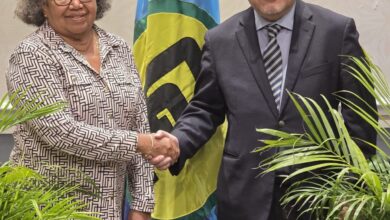TOURISM in Trinidad and Tobago, as well as the Greater Caribbean will be positive impacted by two very different, but important events this month, one in which the first steps have already been taken and the other in two weeks.
With the signing last week of a Memorandum of Understanding (MOU) between the Ministry of Tertiary Education and Skills Training and the University of the West Indies Arthur Lok Jack Graduate School of Business, the ALJGSB will proceed to conduct research into the tourism and entertainment sectors in Trinidad and Tobago.
The other is when the Directorate of Sustainable Tourism of the Association of Caribbean States (ACS), convenes its two-day (July 22-23) meeting of the Special Committee on Sustainable Tourism in Port-of-Spain in two weeks, one of the highlights would be a presentation of the results of the Regional Co-operation Mechanism for Sustainable Tourism Zone of the Greater Caribbean (STZC) project.
This ACS initiative has been ongoing for the past year and includes the development of a website, publication of brochures and destination stewardship manuals to enhance the visibility and value of the STZC to ACS Member countries. The presentation would be done on Day One of the meeting – July 22.
Minister Fazal Karim, speaking at the MOU signing said the study would help identify new opportunities for business development locally and internationally and would also focus on the development of a National Brand Assessment for Trinidad and Tobago as a tourist destination.
He added that the results of the research would also help the ALJGSB to design and outfit a curriculum for a Diploma in Tourism and Entertainment Innovation and a Master of Business Arts (MBA) in music and creative arts.
Another highlight of the ACS meeting will be the ‘Training for Careers in Sustainable Tourism Project’, which is being implemented with the co-operation and assistance from the French Development Agency (AFD). The initiative, which supports the establishment of the Region as a Sustainable Tourism Zone, entails a study to identify the status and needs of Technical and Vocational Education and Training (TVET) in the region’s tourism sector.
This project deals with development of a regional TVET framework for future professional training and capacity building programmes. All in all the meeting is expected to explore avenues for the promotion, growth and continued sustainability of the regional tourism industry.
Recently, the Directorate of Sustainable Tourism of the ACS put out a short paper on “The Professionalisation of Tour Guide Services in the Greater Caribbean. It stated that the Directorate recognised the importance of the tour guide sector within the industry and sought to harness the model applied in the recent establishment of the Regional Network of Artisans to form a regional alliance of Tour Guides.
Aim of such an alliance is to standardise the tour guide service as well as to elevate its general quality. It would work along with national associations dedicated to training and certification of tour guide services so as to enhance tour guide services within the region as well as to develop services where there are gaps to be filled in the region.
Trinidad and Tobago has come in for high praise in this particular area with its Trinidad and Tobago Tourism Industry Certification (TTTIC), which under the Tourism Development Company (TDC), holds instruction sessions for tour guides, as well as tour operators.
In pretty much the same way Cuba has its Cuban Adventures, which is dedicated to the training and qualification of Cuban tourist guides, with the emphasis on education and training of Cuban nationals, which ensures that guides are not privately – an as a result – unfairly commissioned as they are paid by the government.
The Directorate stated, “Maintenance of a high level of service offered by tourist guides in the region, as well as constant improvement of said services is crucial to the growth and enhancement of tourism in the Greater Caribbean
“Very often,” the statement continued, “tour guiding is based on largely informal factors such as familiarity with the area with very little training or formal qualifications or skills required. This method, while it may prove simple and even effective with regard to the fulfilment of employment requirements and the provision of a necessary service, has contributed to a lack of standardisation and consistency of the service offered.”
The Directorate believes, “While the employment of nationals in a local tourist industry is crucial, one must not fail to recognise the importance of necessary training and the acquisition of qualifications towards the holistic improvement of the sector’s services.”
In another reference to the alliance, the Directorate stated that it (alliance) could be used as a platform for sharing best practices within the domain of tour guide training, standardisation and certification for constant improvement of mechanisms and the enhancement of techniques and initiatives.
A report from the Caribbean Environmental Network Project titled “Improving Training and Public Awareness on Caribbean Coastal Tourism” showed there was a “growing trend of providing tour guide training may serve as a disadvantage to a number of unskilled workers for whom jobs within the tourism sector require minimal qualifications.”
It stated that to address these potential detrimental impacts, training, provided by public and private organisations for potential workers as well as permanent training for staff, appeared necessary. Further, “If training is provided throughout, then the issue of unqualified workers within the tourism sector will no longer be an obstacle to regional tourism development,” added the report.
“It is this high level of professionalism of tour guide services that the Directorate of Sustainable Tourism of the ACS aims to implement throughout the Greater Caribbean, with the aim of a more functional operation of the service within the sector.”





